The All-Russian Round Table of Museum Experts Took Place at the HSE University in Perm
The round table was held as part of the joint project of the HSE University in Perm and Sakhalin State University ‘Industrial Culture: Digital Solutions for the Research Ecosystem’ of the ‘Mirror Laboratories’ competition and brought together museum experts and university researchers from the Perm region, Sverdlovsk, Kemerovo, Chelyabinsk, Sakhalin regions and Yamalo -Nenets Autonomous district. The non-traditional format of the event allowed not only to discuss current issues of preserving industrial heritage, but also, within the framework of the workshop and strategic session, to identify new areas of cooperation between universities and museums.
Elena Shadrina, Deputy Director for Science at HSE University in Perm, addressed the participants of the round table with a welcoming speech. Elena Shadrina wished the participants productive creative work and emphasized that this is the first major event of the Mirror Laboratories project related to interinstitutional interaction.
The head of the project ‘Industrial Culture: Digital Solutions for the Research Ecosystem’ on the part of the HSE University in Perm, Liliya Panteleeva, in her report covered what industrial culture is as a heritage object, who were the heroes of the industrial era, how to collect material and how to research it. The expert identified the problem that the carriers of the industrial culture of the late Soviet era are now passing away. At the same time, as a rule, museums do not record first-person stories, and the importance of careful collecting work is not realized by regional representatives of the educational sphere and local historians.
Alexandra Salatova, head of the project ‘Industrial Culture: Digital Solutions for the Research Ecosystem’ from Sakhalin State University, presented the main idea of the project, which is to develop interdisciplinary and digital tools for analyzing markers, artifacts and effects of industrial culture, as well as to implement interinstitutional interaction with museums for the preservation and popularization of industrial heritage.
By 2025, it is planned to create an automated information system ‘Anthropology of Labor’, based on historical and anthropological sources about various professions. The first element will be the ‘Corpus of Miners’ Narratives’. In addition, one of the important tasks of the project is the development of an inter-institutional research ecosystem program, which is aimed at integrating specialists from museums into the scientific space. The holding of the All-Russian Round Table of Museum Experts at the HSE University in Perm was one of the first steps towards its implementation.
Alexandra Salatova also conducted a workshop on analyzing the activities of museums using the Osterwalder’s methodology and a mini-strategic session on options for implementing inter-institutional interaction between museums and universities, research groups, municipalities, etc. The round table participants identified possible areas of cooperation.
Evgenia Pashentseva, head of the history department of the Sakhalin Regional Museum of Local Lore, shared the problems of collecting, preserving, and popularizing the memories of eyewitnesses of the industrial era in the Sakhalin region. For example, one of the difficulties is that few of the first settlers remained on the island; many left for the mainland in the 1990s. Leading researcher in the regional studies sector of the Scientific Center for Arctic Studies, Galina Guryanova, using the example of Yamal cities, spoke about memory studies and museumification of local history, inspiring all participants of the round table with her speech.
At the end of the event, Liliya Panteleeva presented the prospects and opportunities of the research ecosystem, spoke about the scientific, applied, and educational tasks of the project and the possibility of museums participating in them. This can be not only collecting materials and joint expeditions, but also developing Science&Art projects, submitting joint applications for grants, developing and conducting advanced training courses within the framework of the project topic, etc.
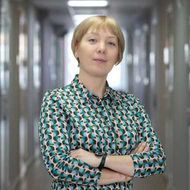
Liliya Panteleeva, head of the project ‘Industrial Culture: Digital Solutions for the Research Ecosystem’ (HSE University in Perm)
The All-Russian round table of museum experts is the first inter-institutional event within the framework of our project. During the round table, the problem of the need to preserve and popularize by museums the living memories of people working at enterprises of the late Soviet era was discussed. This problem was realized by us during anthropological expeditions in the Perm region and the Sakhalin region. In the collections of the museums where we were able to work, the ‘living’ voices of the pioneers of mines and factories are practically not represented. The private history of post-war workers is almost not reflected in the collections. Stories about the labor culture of the late Soviet era are also sparse, although the generation of these workers is still alive.
In solving this problem, we see great potential for combining efforts on the part of the academic community and museums, whose interests are related to the study of industrial crops. In the field of scientific research, cooperation can be realized through the collection and analysis of material, joint publications, and events. In the applied field, partnerships can be organized through the collection and systematization of material for databases, the development of projects and expert opinions.
We organized an unconventional format for the event: we provided not only a place for reports and discussions, but also introduced a practical work component. During the workshop and strategy session, participants worked with tasks to find new ways to promote museum services. The principal objective of this section was to update the awareness of the expert role of museums in collecting material based on information requests.
The round table participants included directors and leading researchers of museums, as well as researchers of urban and professional culture. The geography of the participants covered the Perm region (Berezniki, Gremyachinsk, Gubakha, Kizel, Krasnovishersk, Perm, Solikamsk), the Kemerovo region (Kemerovo), the Sakhalin region (Yuzhno-Sakhalinsk), the Sverdlovsk region (Ekaterinburg), the Chelyabinsk region (Magnitogorsk), Yamalo-Nenets Autonomous district (Salekhard).
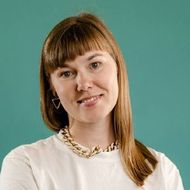
Alexandra Salatova, head of the project ‘Industrial Culture: Digital Solutions for the Research Ecosystem’ (Sakhalin State University)
During the round table, we tried not only to exchange experience in preserving industrial heritage with colleagues from regional museums, but also to try to look at the topic more broadly – beyond the traditional functionality of the museum as a collector and custodian of thematic material. To do this, I used the business project outline of Alexander Osterwalder and the tools of the strategic session. This is how we came to the problem areas in the functioning of museums, namely, that they do not always position themselves as a partner or side of a major study, an expert in this area. But such positioning and implementation of research activities is critically important for the development of the museum itself. In addition, it will allow not only to accumulate material, but also to actively study it for scientific purposes.
Our project to create digital solutions for the research ecosystem will help museums with this. To put it very simply, we plan to create not just a single corpus, but a series of different corpora and databases on industrial culture, a kind of domestic Wikipedia on industrial heritage. Its users will be scientific groups, museums, representatives of civil science (scientific volunteers), who will be able to replenish it with new artifacts and use the accumulated materials to increase scientific knowledge. We can only cover such a large-scale area as industrial culture with the entire scientific community. And we have already taken the first step in this direction — we have begun to form a distributed community of regional industrial museums.
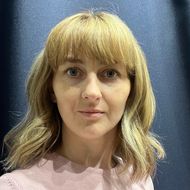
Evgenia Pashentseva, head of the history department of the Sakhalin Regional Museum of Local Lore
The last round table was devoted to one of the pressing problems in the museum community — preserving the memories of industrial workers, eyewitnesses of the industrial era. On the one hand, the task of preserving memory, information, objects, markers of the era and presenting them to the visitor is obvious. On the other hand, museum specialists do not always keep up with time and often the ‘time to collect’ comes late.
At the Sakhalin Regional Museum of Local Lore, researchers started collecting, translating on paper, and storing audio recordings of interviews with the memories of old-timers (the first settlers, workers in the coal, fishing, forestry, and agriculture industries) relatively recently, in the 2010s. At first, it was believed that this material would be useful only in the main activities of the museum and would be irrelevant outside the region. The round table erased all regional boundaries and showed how significant this information is today regardless of where it is collected.
An important result of the round table was that the problem of collecting and preserving memories was discussed (identified), experienced by all participants and brought into a specific strategy of action. Many thanks to the organizers and the project team for the opportunity to share their experience and look at their work from the outside. I wish further growth and development to the project!
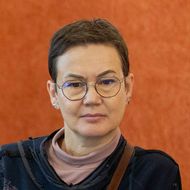
Galina Guryanova, associate professor, art historian, leading researcher in the regional studies sector of the Scientific Center for Arctic Studies
Many thanks to the team of ‘Mirror Laboratories’ for the idea, the energy of its promotion and, as a result, the thoughtful organization and implementation of the All-Russian Round Table of Museum Experts ‘Industrial Culture: Digital Solutions for the Research Ecosystem’. It is relevant and extremely important for the museum community to see and hear problems and think about prospects. It is especially important that this project offers museums the development of a different, modern scientific view of the industrial history of the regions, bringing people to the main place in the research and presentation of museum exhibits at exhibitions.
A diverse and representative group of round table participants was assembled, and various forms of work were proposed. The exchange of opinions, knowledge and emotions made the work very productive. And how many new acquaintances and prospects for further work! I am returning to Salekhard with the desire to involve Yamal museums in collecting materials about the industry of the region from the perspective of an individual, as well as the possibility of expert work based on the collected information. We hope to communicate and develop science and museums, considering the capabilities of distributed scientific teams.
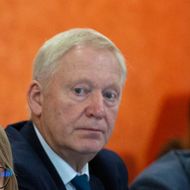
Alexander Cherepanov, creator and director of the Retro Garage Museum (Perm)
At the round table, together with representatives of Berezniki, Solikamsk, Magnitogorsk, Kemerovo and Sakhalin, we discussed the role of museums in preserving and popularizing industrial history. A workshop on analyzing the activities of museums and a mini-strategic session on cooperation between universities and industrial museums were a great success. The event was successfully implemented within the framework of a joint project of the HSE University in Perm and Sakhalin State University.
Special thanks to the main speakers of the event: PhD in Philology Liliya Panteleeva (Perm) for her excellent presentation of the topic ‘Industrial culture as an object of research’ and PhD in Sociology Alexandra Salatova (Sakhalin) for her excellent report ‘Introduction to research interinstitutional cooperation in the study of industrial heritage’. We have grandiose and realistic joint plans!
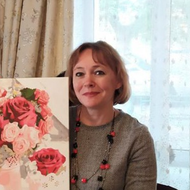
Elena Kozlova, researcher at the Magnitogorsk Museum of History and Local Lore
As part of the round table, current issues were raised, including those related to the activities of the Magnitogorsk Historical and Local Lore Museum as a custodian of the memory of the construction of a factory in our city — a giant of the metallurgical industry. Thus, Liliya Panteleeva in her report made convincing calls to museum workers, volunteers and interested public organizations about the need to work to collect and preserve historical memory in the form of living stories and memories of eyewitnesses of the country’s powerful industrial era.
Alexandra Salatova consolidated the round table participants with interactive forms of work, encouraging them to find new methods and approaches to solving pressing problems of each active association, and in an accessible form outlined the difficulties and advantages of inter-institutional interaction, as well as the interaction of research institutes and museums.
Evgenia Pashentseva, in a report on anthropological research in the Sakhalin region, shared her experience in the field of collecting, preserving, researching and analyzing materials: memories and stories of the oldest residents of the Sakhalin region. Galina Guryanova told about the originality of Yamal cities, about the experience of researching objects that make up museum collections.
In general, the organizers and participants of the round table discussed problems in preserving historical memory and the heritage of the era of industrial culture, and proposed new approaches to solving problems, including the development of software and the creation of a platform for a research ecosystem.
We thank the organizers for the new opportunities revealed during the round table for the development of our museum and wish success in the creative cooperation of state institutions and regional museums, and the joint implementation of planned projects.
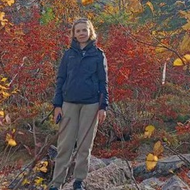
Yulia Kruchinina, specialist in exposition and exhibition activities of the Krasnovishersk Museum of Local Lore
The time quickly passed by participating in the round table discussions at HSE University in Perm. Many problems were discussed and analyzed, and I would like to write words of gratitude for the creation of this project to Liliya Panteleeva and Alexandra Salatova for bringing together experts from all over Russia, for the opportunity to share their own and learn from others’ experience in solving problems in the museum field, for recognizing and forming new important tasks in this direction, which is important for understanding one’s own history.

